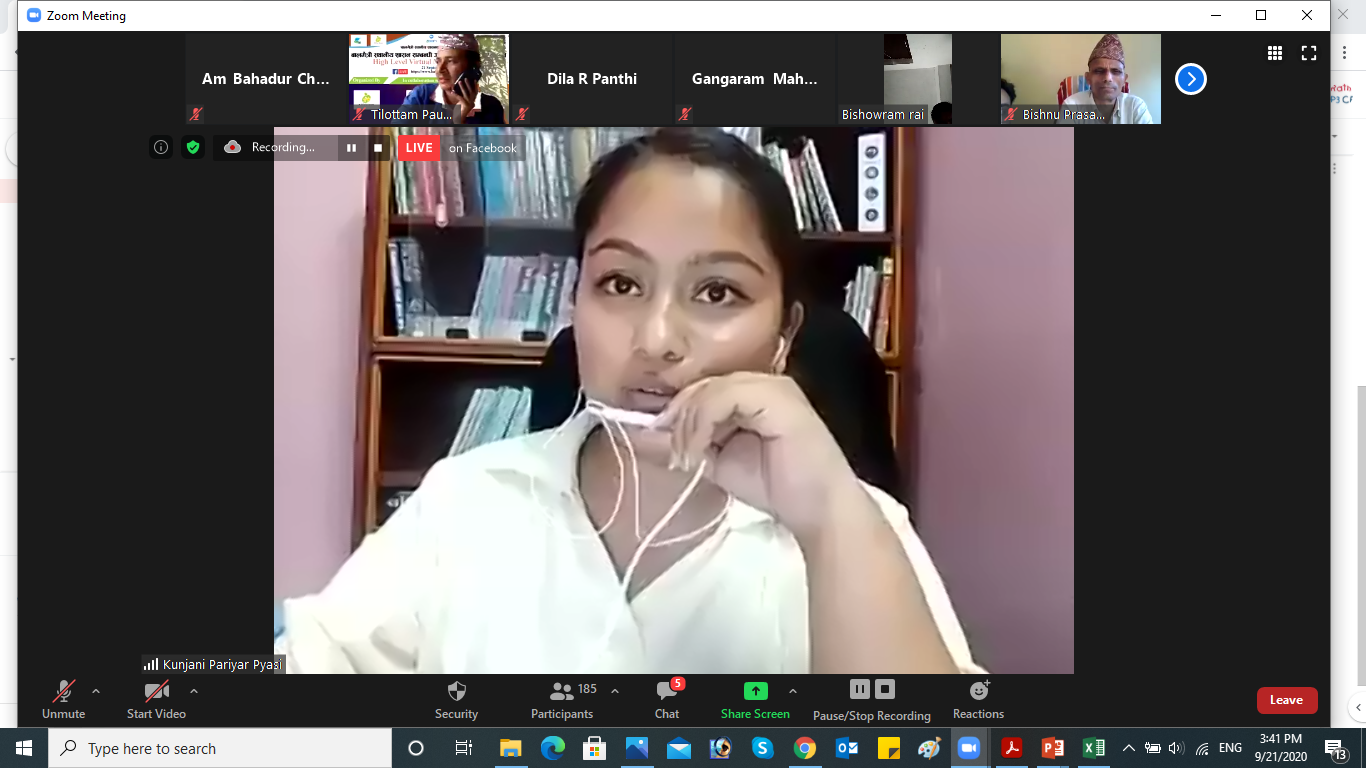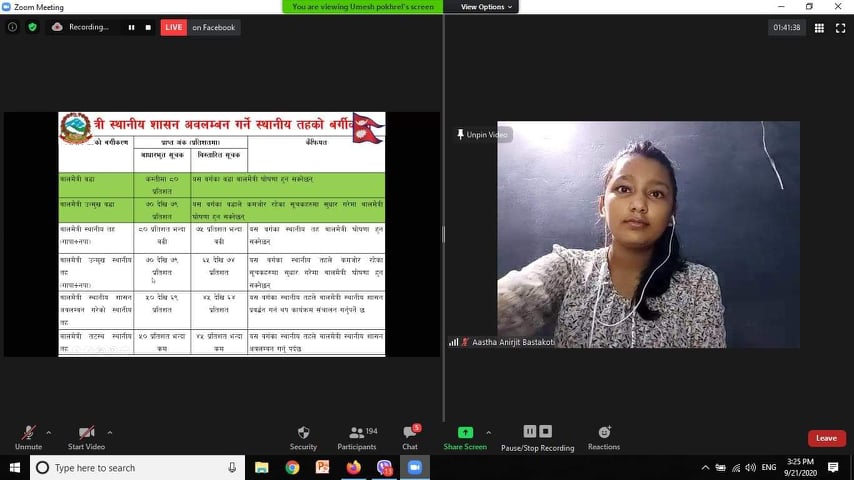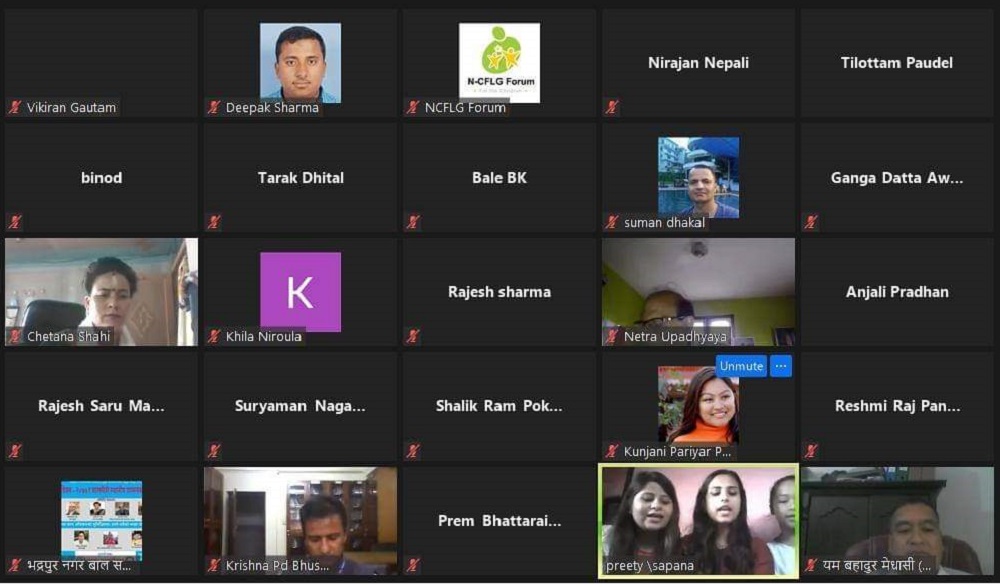Stakeholders have urged for quick amendment of CFLG National strategy and Operational Guidelines, 2068
21 September, Kathmandu. In the current situation where the country is gripped with fear of COVID-19 transmission, children are the most affected groups, especially with a large number of them deprived from education, health and above all institutionalized participation in the areas of their concerns. The stakeholders of children have highlighted the utmost importance of effective implementation of the Child Friendly Local Governance framework in such scenario during the High Level meeting conducted via ZOOM.
The program organized by National Child Friendly Local Governance Forum (NCFLGF), in coordination with Jagriti Child and Youth Concern Nepal (JCYCN) and support of World Vision International Nepal (WVIN) created a common understanding among the participants regarding the agenda of CFLG and emphasized the need to increase investment in children with the promotion of CFLG. The Child Friendly Local Governance is the concept that mainstreams the areas of child rights; child survival, child protection, child development and child participation in the policy, mechanism, programs, budget and code of conduct of the government by also ensuring institutionalized participation of children. The CFLG Campaign formally initiated in 2070 at Pragatinagar, Nawalpur has been adopted in more than 40 Local Level Institutions covering all the seven provinces of the country, and many more have realized its importance. The outbreak of COVID-19 has pushed the campaign away from the limelight. The stakeholders have pointed higher relevancy of child friendly governance framework to efficiently reach the most disadvantaged children, especially in the present emergency context.

The CFLG National strategy and Operational Guidelines, endorsed by Nepal Government in 2068 B.S, is the guiding document for the implementation of CFLG at all Local Level Institutions. But, this document is not in accordance with the spirit of the Local Governance Act, 2074, and needs urgent amendment. The program also projected the need of necessary efforts from various levels for the quick endorsement of amended CFLG National strategy and Operational Guidelines. Though development partners like UNICEF, World Vision International Nepal, Care Nepal, Good Neighbours International, Save the Children and many other have shown interest for the promotion of CFLG, the lack of the endorsement of the National strategy has become a great challenge.
Ms. Anjali Serchan from UNICEF, Somalia as well as the former chief of CFLG Unit of UNICEF, Nepal provided presentation on the history, aim and goal of CFLG. The Under secretary of Ministry of Federal Affairs and General Administration, Mr. Dila Ram Panthi spoke on child clubs and their role in the establishment of Child Friendly Local Governance. Mr. Bijaya Raj Subedi, Undersecretary of Ministry of Education, Science and Technology gave presentation on the progress, constraints and way forward for the implementation of CFLG. Mr. Krishna Prasad Bhusal, Undersecretary of Ministry of Women, Children and Senior Citizens provided remarks on the role of the concerned Ministry in the promotion of CFLG at all levels. Similarly, Mr. Reshmi Raj Pandey, Secretary of Ministry of Defence and former chief, Local Government Division, provided presentation on the roles of the specific stakeholders for the adoption of CFLG. Mr. Milan Raj Dharel, Executive Director of National Child Rights Council provided speech on the role of National Child Rights Council in the establishment of CFLG.

The program was hosted by the Coordinator of National CFLG Forum and President of Jagriti Child and Youth Concern Nepal, Mr. Tilottam Paudel. Ms. Bipana Sharma provided the welcome remarks as well as clarification on the objectives of the program. Various CFLG Campaigners like Dipak Sharma, Khimananda Bhusal, Rocky Prasad Shah, Gopal Bhat, Ashok Khanal, Haribol Acharya, Rajesh Sharma, Bhuwan Dahal, Resam Sharma, Kunjani Pariyar Pyashi and Nirijana Bhatta shared their experience of working exclusively in CFLG. Similarly, various representatives like Parbati Sunuwar, Vice chairperson of Fikkal Rural Municipality, Sindhuli, Seti Mahat, Vice chairperson of Modi Rural Municipality, media representative Mr. Kumar Yatru, Dil Air from Save the Children and many other representatives also provided remarks during the program.
Participants stressed on the need to invest in government-level policies and budgets, make all the physical structures child-friendly, set budget ceiling for children, solicit children’s opinions from children’s consultations during the inception of annual program and budget, and hasten the formation of child rights committee as per Children Act, 2075 BS. It was concluded that with the establishment of CFLG at all local levels, a sustainable approach to ensuring the protection of children during all situations and emergencies can be brought and special provisions feasible for the Local Government to ensure protection of the most marginalized children including the children with disabilities, LGBTIQ children and so on can be placed.

Nearly 250 representatives from 5 development partners, 50 elected representatives from 40 districts, and 15 Child Rights Network, Child Club Graduates, Child Rights activists, child club members and CFLG Campaigners were present in the program. Mr. Yagya Sharma, member of National CFLG Forum provided the closing remarks as well as vote of thanks.
The Secretariat of the National Child Friendly Local Governance Forum is in Jagriti Child and Youth Concern Nepal. The Forum is composed of CFLG Campaigners representing all the seven provinces.
प्रकाशित मिति : ५ आश्विन २०७७, सोमबार ०७:३१












